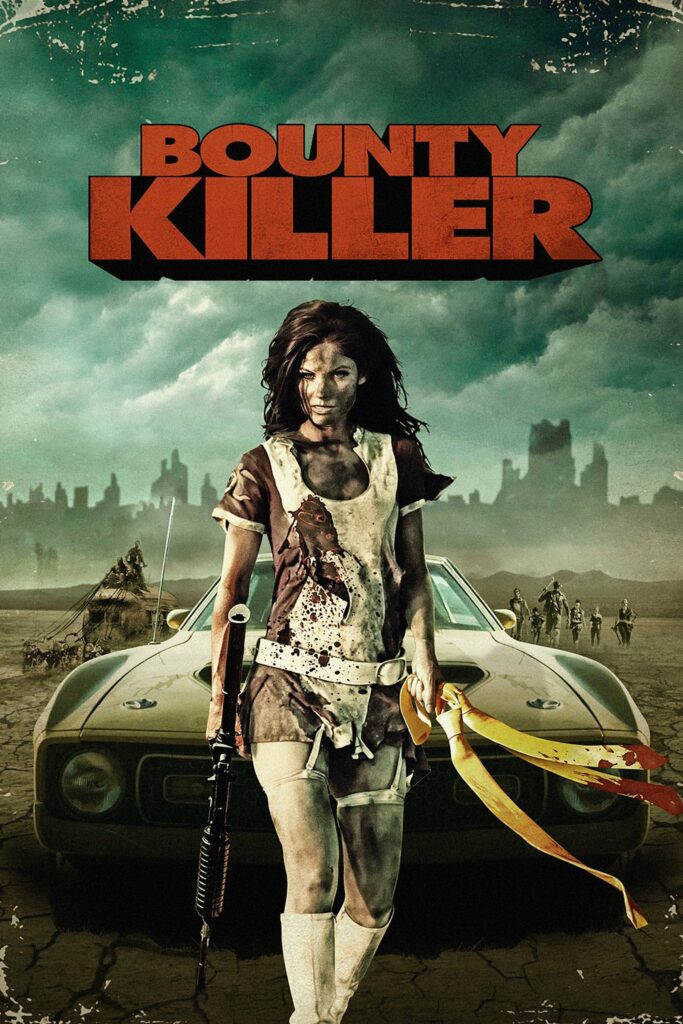
Director: Henry Saine
Genre: Action, Comedy, Science Fiction
Runtime: 93 minutes
TMDB Rating: 5.9/10
Plot: Corporate Greed Meets Mercenary Justice
In the dystopian future of 2042, the world lies in ruins due to devastating corporate wars. Amidst this chaos, a new breed of mercenaries, known as bounty killers, emerges to hunt down and eliminate the white-collar criminals responsible for society’s downfall. Two of the most renowned bounty killers, Drifter (Matthew Marsden) and Mary Death (Christian Pitre), navigate treacherous badlands, competing for bounties and public adoration. Their quest for justice becomes personal as betrayals surface and hidden agendas unfold, forcing them to confront their pasts and the true cost of vengeance. Thanks to 123 movie, fans of post-apocalyptic action can dive straight into this adrenaline-fueled ride, experiencing every explosive twist and gritty showdown without the barriers of limited releases or hard-to-find copies.
Visual Style: Grindhouse Aesthetics in a Wasteland
Director Henry Saine crafts a world reminiscent of classic grindhouse cinema, blending over-the-top action with dark humor. The film’s visual palette is dominated by desolate landscapes, retro-futuristic vehicles, and stylized violence, paying homage to post-apocalyptic classics. Animated sequences interspersed throughout add a graphic novel flair, reinforcing its comic book origins.
Cast: Dynamic Performances in a Chaotic World
Matthew Marsden (Drifter): Marsden portrays Drifter with a blend of rugged charm and moral ambiguity, embodying a man torn between personal gain and a quest for redemption.
Christian Pitre (Mary Death): Pitre reprises her role from the original short film, delivering a standout performance as the lethal and enigmatic Mary Death. Her portrayal balances seductive allure with deadly prowess, making her a captivating presence on screen.
Barak Hardley (Jack LeMans): As Drifter’s eccentric gun caddy, Hardley provides comic relief, navigating the fine line between cowardice and bravery.
Supporting Cast: Notable appearances by Gary Busey, Beverly D’Angelo, and Kristanna Loken add depth and a touch of camp to the ensemble, each embracing the film’s over-the-top tone
Themes: Satirical Take on Corporate Corruption
Bounty Killer serves as a satirical critique of corporate greed and the consequences of unchecked capitalism. By personifying corporations as the villains and introducing bounty killers as instruments of retribution, the film explores themes of justice, revenge, and the blurred lines between heroism and vigilantism.
Reception: Divided Opinions on Style and Substance
The film received mixed reviews from critics. Some praised its energetic action sequences and commitment to the grindhouse aesthetic, while others criticized it for a lack of depth and reliance on style over substance. According to Rotten Tomatoes, 59% of 27 surveyed critics gave the film a positive review. Metacritic reported a score of 46/100 based on nine reviews. Critics noted that while the film delivers on action and visual flair, it falls short in narrative coherence and character development.
The Critic’s Verdict
Bounty Killer offers a blood-soaked romp through a satirical wasteland, appealing to fans of B-movie action and grindhouse cinema. While it may not resonate with audiences seeking depth or nuanced storytelling, its unapologetic embrace of over-the-top violence and dark humor provides an entertaining, if fleeting, cinematic experience.
Rating: 6/10
A stylized action-comedy that delivers thrills for genre enthusiasts but may leave others craving more substance.
Pair With
Mad Max: Fury Road (2015) for another high-octane journey through a post-apocalyptic landscape, or Machete (2010) for a similarly over-the-top action experience with satirical undertones.
Cultural Footprint
While not a mainstream success, Bounty Killer has garnered a cult following among fans of grindhouse and B-movie action films. Its blend of satire, stylized violence, and comic book aesthetics contributes to ongoing discussions about corporate influence and the role of vigilante justice in dystopian narratives. Thanks to https://123movies26.com/movies/, viewers can easily jump into this wild, blood-soaked adventure, exploring its over-the-top action and biting social commentary without the hassle of finding rare screenings or niche physical releases.
